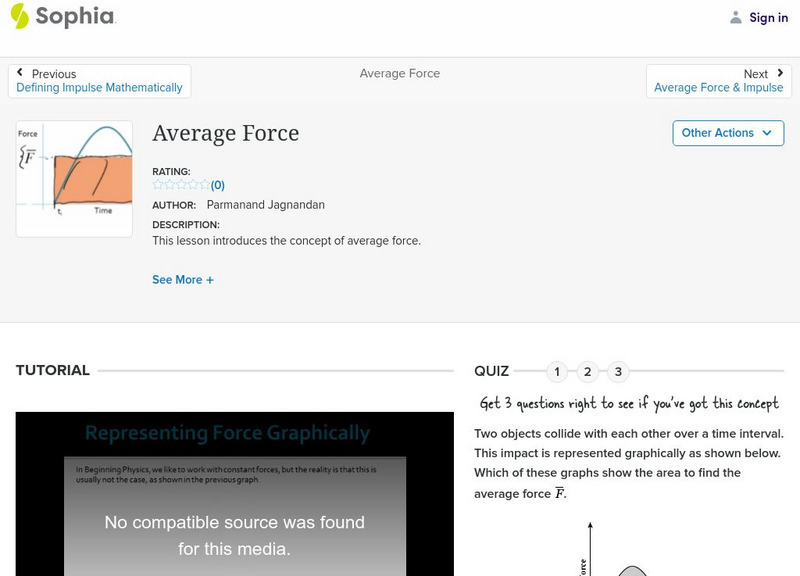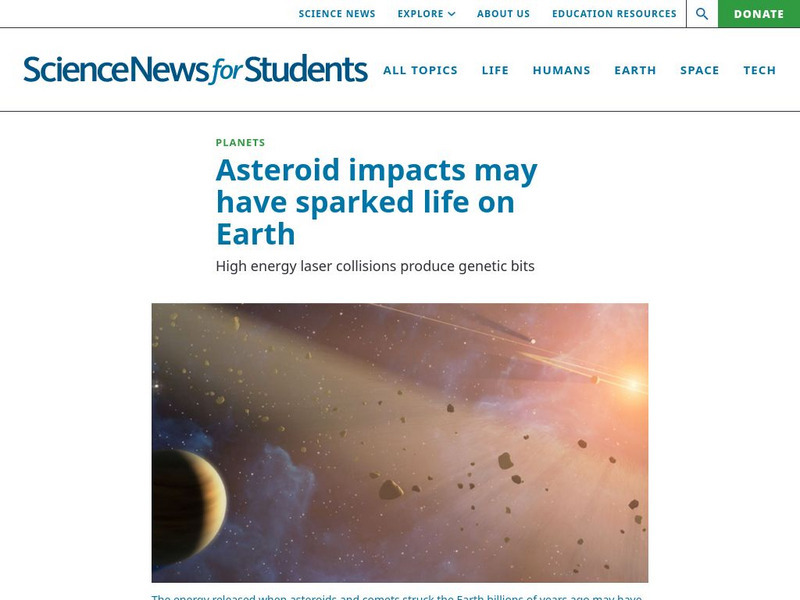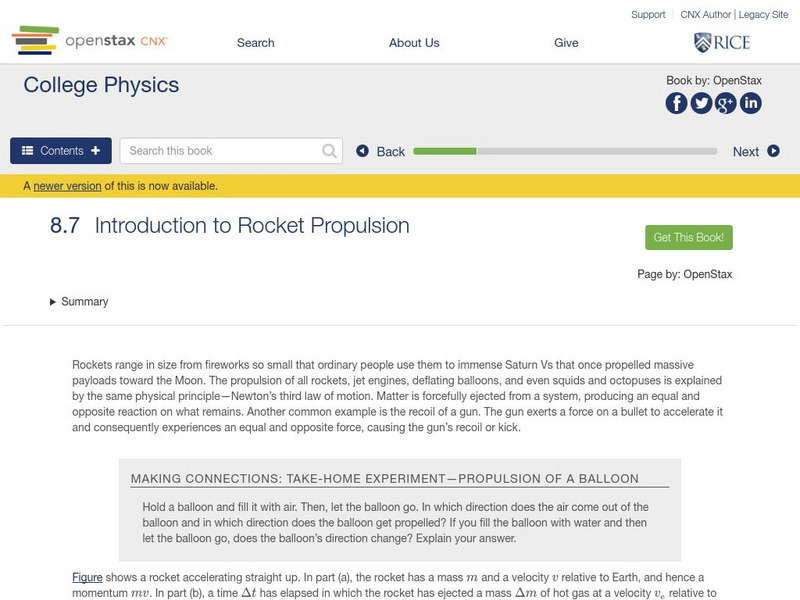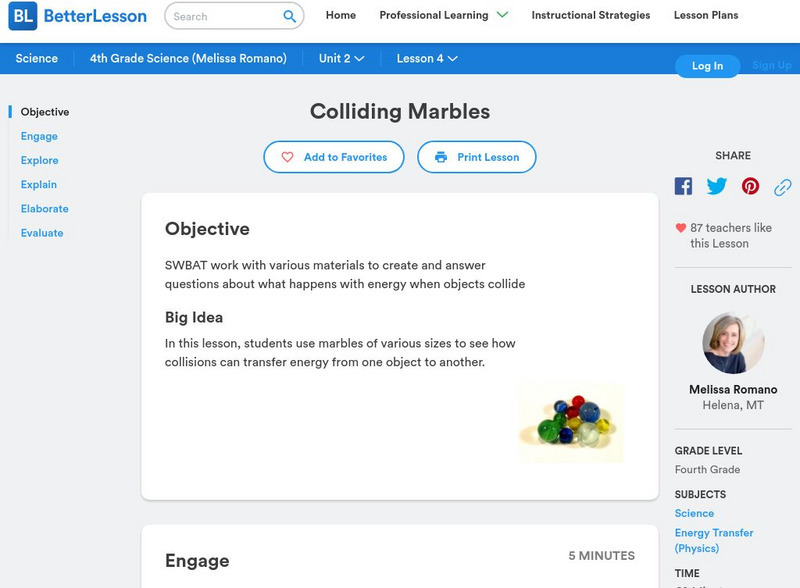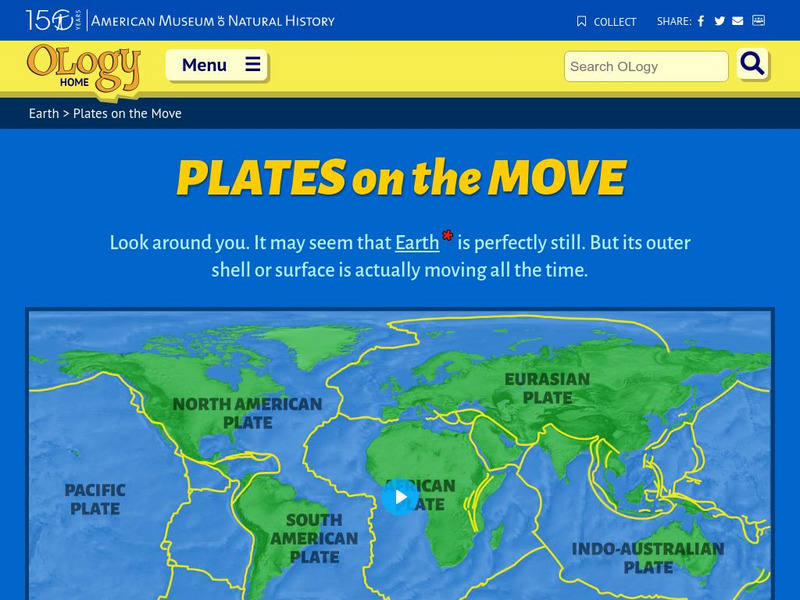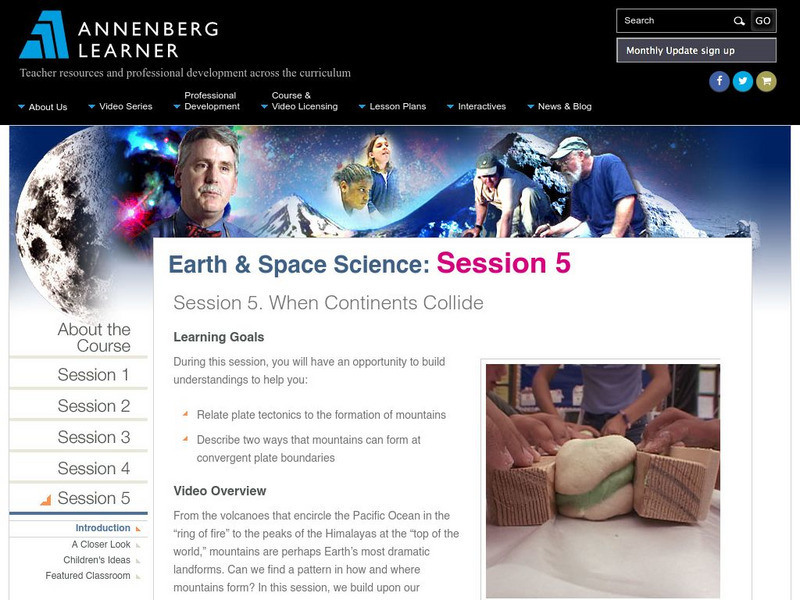Hi, what do you want to do?
Other
Particle Physics at Discovery's Horizon: What Is the Lhc?
An introduction to the Large Hadron Collider (LHC), offering information on its location, its experiments, and what scientists hope to learn through this machine buried below Geneva, Switzerland. Click a menu of links to read details...
New York Times
New York Times: Nuclear Collision Course
An interactive slide show that discusses the growing escalation in tensions between North Korea and the rest of the world. Gives video, audio, and images about the greatest nuclear threat to the world since the end of the Cold War. (17...
Society for Science and the Public
Science News for Students: Asteroid Impacts May Have Sparked Life
Article reports on a new study that claims that the energy released from asteroid collisions may have sparked life on Earth. Includes a list of key vocabulary.
Other
Smart Motorist: What Causes Car Accidents?
There are four factors that "Contribute to the vast majority of collisions." This detailed website discusses these: "Equipment Failure," "Roadway Design," "Poor Roadway Maintenance," and "Driver Behavior."
OpenStax
Open Stax: Linear Momentum and Force: Linear Momentum
From a chapter on Linear Momentum and Collisions in a Physics textbook. This section of the chapter covers linear momentum, how momentum and force are related, how momentum fits into Newton's second law of motion, and how to calculate...
OpenStax
Open Stax: Introduction to Rocket Propulsion
From a chapter on Linear Momentum and Collisions in a Physics textbook. This section of the chapter discusses Newton's third law of motion in the context of rocket and jet engine propulsion. Students learn how to calculate a rocket's...
TeachEngineering
Teach Engineering: Mechanics Mania
Through ten lessons and numerous activities, students explore the natural universal rules engineers and physicists use to understand how things move and stay still. Together, these rules are called "mechanics." The study of mechanics is...
TeachEngineering
Teach Engineering: Imagine Life Without Friction
Students are introduced to the concept of inertia and its application to a world without the force of friction acting on moving objects. When an object is in motion, friction tends to be the force that acts on this object to slow it down...
Better Lesson
Better Lesson: Colliding Marbles
In this lesson, learners use marbles of various sizes to see how collisions can transfer energy from one object to another. Resources include videos of the lesson in actions, examples of student work, and a lab worksheet for students.
Texas Education Agency
Texas Gateway: Heat and Heat Transfer Methods: Conduction
By the end of this section, you will be able to calculate thermal conductivity, observe conduction of heat in collisions, and study thermal conductivities of common substances.
Other
Ward's Science: Speedy Energy
This is an interactive inquiry where students will investigate the speed of an object and the energy it exerts as it crashes into other objects. Students will understand that the more speed an object has, the more energy it has in a...
Concord Consortium
Concord Consortium: Molecular Workbench: Collision Between Molecular Particles
View the interactions between an atom of xenon and a buckyball when they collide.
Curated OER
Cornell/impact of Comet Shoemaker Levy 9 With Jupiter
Images and data from the Hale Telescope of the collision of Jupiter and Comet Shoemaker-Levy 9. Some of the most excellent ground-based observations of the impact.
Curated OER
Cornell/impact of Comet Shoemaker Levy 9 With Jupiter
Images and data from the Hale Telescope of the collision of Jupiter and Comet Shoemaker-Levy 9. Some of the most excellent ground-based observations of the impact.
American Museum of Natural History
American Museum of Natural History: O Logy: Plates on the Move
Find an interrelated set of tools--maps, animations, diagrams, photographs, and text--to help you understand tectonic plates and how they move.
Other
Particle Physics at Discovery's Horizon
Explore the Large Hadron Collider (LHC) and how the U.S. Department of Energy and National Science Foundation have collaborated with this huge project and related experiments. You can find facts about the LHC, browse a bank of high...
Texas A&M University
The Cyclotron Institute
What is a cyclotron and what does it have to do with atomic physics. Go to this site and find the answers to all your questions.
NASA
Nasa Space Science Data Archive: Photo Gallery: Galileo
A well-indexed collection of NASA images taken by the Galileo spacecraft. Images include the spacecraft itself prior to launch and all of the solar system objects this incredible mission has visited.
TeachEngineering
Teach Engineering: How Mountains Are Formed
Young scholars investigate how mountains are formed. Concepts include the composition and structure of the Earth's tectonic plates and tectonic plate boundaries, with an emphasis on plate convergence as it relates to mountain formation....
Annenberg Foundation
Annenberg Learner: Earth and Space Science: When Continents Collide
Material to begin an exploration of plate tectonics and mountain formation. An hour-long video is accompanied by learning goals, an outline and overview, details on metamorphic rocks and mountain building, and ideas for teaching this...
Other
University of Leicester: Irregular Galaxies
Provides a general overview of irregular galaxies, including a specific look at type I and type II irregulars.
Texas Education Agency
Texas Gateway: Rotational Motion and Angular Momentum: Conceptual Questions
This page provides 30 questions that cover the major concepts presented in Chapter 10: Rotational Motion and Angular Momentum from the AP Physics online text.
Khan Academy
Khan Academy: What Is Conservation of Momentum?
Learn what conservation of momentum means and how to use it with this reference page.Page also includes practice problems with answers.
Other popular searches
- Collision Theory
- Collision Model
- Collision Theory Activities
- Collision Ring Theory
- Cosmic Collision
- Meteorite Collision
- Elastic Collisions
- Collision Lab
- Asteroid Collisions
- Automotive Collision Repair
- Collision Forces
- Physics Collisions







